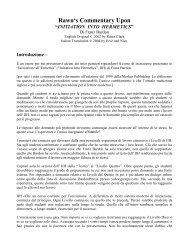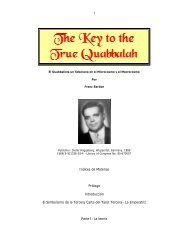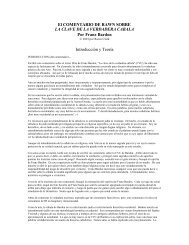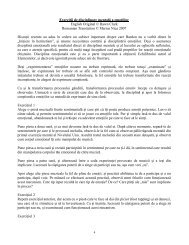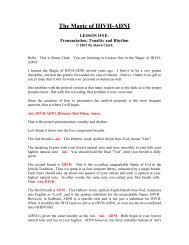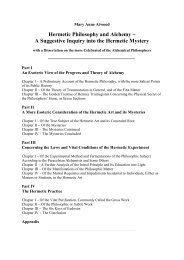Secrets of the Adepts - A Bardon Companion
Secrets of the Adepts - A Bardon Companion
Secrets of the Adepts - A Bardon Companion
You also want an ePaper? Increase the reach of your titles
YUMPU automatically turns print PDFs into web optimized ePapers that Google loves.
<strong>the</strong> unctuous or oyly parts <strong>of</strong> Vegetables, but ei<strong>the</strong>r reject or leave untouched <strong>the</strong> Remainder<br />
being less oyly and heterogeneous to it self: it becomes <strong>the</strong> strongest when we temper its<br />
Unctuosity with Arids, (that is, dry things, not Oyly) for so it is made homogeneous to things<br />
dry-oyly, and to things meerly dry. In respect <strong>of</strong> which Homogeneity, <strong>the</strong> Menstruums <strong>of</strong> <strong>the</strong><br />
<strong>Adepts</strong> differ from <strong>the</strong> common, because <strong>the</strong>y do by reason <strong>of</strong> <strong>the</strong> said Homogeneity, remain<br />
with <strong>the</strong> things dissolved inseparably; yea, are augmented by <strong>the</strong>m, but not with <strong>the</strong> least<br />
saturation, transmuted and melted into a third substance, and so cannot part without <strong>the</strong><br />
diminution or destruction <strong>of</strong> <strong>the</strong>ir former Virtues. The permanent Homogeneity <strong>of</strong><br />
Menstruums with things to be dissolved, is <strong>the</strong> reason why Essences are made with simple<br />
Vegetable Menstruums, but Magisteries with <strong>the</strong> same compounded, and so <strong>the</strong>se operate<br />
more strongly, those more weakly. This is it, to comprehend all in a word, which shews us <strong>the</strong><br />
various kinds <strong>of</strong> Menstruums distinct one from ano<strong>the</strong>r in so many several degrees, now to be<br />
described and illustrated by our Annotations.<br />
But that you may more easily understand <strong>the</strong> following Receipts and me also, I thought it<br />
necessary to preadmonish some certain things concerning <strong>the</strong> Nature and Property <strong>of</strong> this<br />
Spirit <strong>of</strong> Wine, lest you should judge amiss <strong>of</strong> a thing not sufficiently understood.<br />
First, you are not to take <strong>the</strong> Spirit <strong>of</strong> common Wine, though never so much rectified for<br />
<strong>the</strong> Philosophical Spirit <strong>of</strong> Wine; for so <strong>the</strong> following Receipts <strong>of</strong> all Menstruums would be<br />
erroneous and seducing.<br />
Having occasion (saith Zacharias) for a most excellent Aqua Vitæ for <strong>the</strong> dissolving <strong>of</strong> a<br />
mark or half a pound <strong>of</strong> Gold, we bought a large Vessel <strong>of</strong> <strong>the</strong> best Wine out <strong>of</strong> which we did<br />
by a Pellican obtain great plenty <strong>of</strong> Aqua vitæ, which was <strong>of</strong>ten rectified in many Glass-<br />
Vessels bought for that end: <strong>the</strong>n we put one Mark <strong>of</strong> our Gold, being before calcin’d a whole<br />
month, and four Marks <strong>of</strong> Aqua vitæ into two Glass-Vessels, one Retort entering into <strong>the</strong><br />
o<strong>the</strong>r, being sealed, and both placed in two great round Furnaces: we bought also Coals to <strong>the</strong><br />
value <strong>of</strong> thirty Crowns at one time, to continue Fire under it for <strong>the</strong> space indeed <strong>of</strong> a whole<br />
Year. We might have kept Fire for ever before any congelation would have been made in <strong>the</strong><br />
bottom <strong>of</strong> <strong>the</strong> Vessels, as <strong>the</strong> Receipt promised, no solution preceding; for we did not operate<br />
upon a due matter, nor was that <strong>the</strong> true water <strong>of</strong> Solution, which ought to dissolve our Gold,<br />
as appeared by experience, pag. 783. Vol. I. Th. Chym. Ripley admonisheth us <strong>of</strong> <strong>the</strong> same<br />
thing, who saith, Some think that this Fire (this Fiery Spirit <strong>of</strong> Philosophical Wine) is drawn<br />
from Wine according to <strong>the</strong> common way, and that it is rectified by distillations <strong>of</strong>ten<br />
repeated, till its watry Phlegm, which impedes <strong>the</strong> power <strong>of</strong> its Igneity, be wholly taken from<br />
it. But when such a sort <strong>of</strong> Water (which Fools call Pure Spirit) though a hundred times<br />
rectified, be cast upon <strong>the</strong> Calxes <strong>of</strong> any Body, be it never so well prepared, we do<br />
never<strong>the</strong>less see, that it is found weak and insufficient as to <strong>the</strong> act <strong>of</strong> dissolving a Body, with<br />
<strong>the</strong> preservation <strong>of</strong> its Form and Species, Cap. 2. Suæ Medul. Phil. Common Wine (saith he a<br />
little lower) is hot, but <strong>the</strong>re is ano<strong>the</strong>r sort much hotter, whose whole substance is by reason<br />
<strong>of</strong> its aerity most easily kindled by Fire, and <strong>the</strong> Tartar <strong>of</strong> this unctuous Humor is thick; for so<br />
saith Raymund: That Tartar is blacker than <strong>the</strong> Tartar from <strong>the</strong> black Grapes <strong>of</strong> Catalonia;<br />
whereupon it is called Nigrum nigrius Nigro; that is, Black blacker than Black: and this<br />
humidity being unctuous, doth <strong>the</strong>refore better agree with <strong>the</strong> Unctuosity <strong>of</strong> Metals, than <strong>the</strong><br />
Spirit extracted from common Wine, because by its liquefactive virtue Metals are dissolved<br />
into Water; which operation <strong>the</strong> Spirit <strong>of</strong> (Common) Wine cannot perform; which, how strong<br />
soever, is nothing else but clear water mix’d with a kind <strong>of</strong> Phlegmatick Water, where on <strong>the</strong><br />
contrary, in this our Unctuous Spirit distilled, <strong>the</strong>re is no Phlegmatick aquosity found at all.<br />
But this thing being rare in our Parts, as well as o<strong>the</strong>r Countries, Guido Montanor <strong>the</strong>refore<br />
<strong>the</strong> Grecian Philosopher found out ano<strong>the</strong>r unctuous humidity, which swims upon o<strong>the</strong>r<br />
Liquors, which humidity proceeds from Wine; to <strong>the</strong> knowledge here<strong>of</strong> attain’d Raymund,<br />
Arnold, and some o<strong>the</strong>r Philosophers, but how it might be obtained, said not.



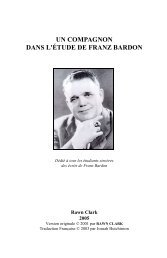
![Magie de YHVH-ADNY et Archeus[1]](https://img.yumpu.com/16926522/1/190x245/magie-de-yhvh-adny-et-archeus1.jpg?quality=85)
